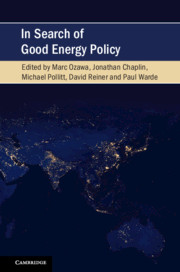Book contents
- In Search of Good Energy Policy
- In Search of Good Energy Policy
- Copyright page
- Contents
- Figures
- Tables
- Contributors
- Acknowledgments
- 1 Introduction
- Part I Multidisciplinary Perspectives
- 2 Political Science and Energy
- 3 Economics – The Proper Valuation of Security and Environment
- 4 Good Energy: Philosophical Perspectives
- 5 Public Theology – ‘Grounded’: An Energy Policy Rooted in Human Flourishing
- 6 Anthropology and Energy Policy
- 7 History: A Long View?
- 8 Management – From the Drawing Board to Successful Delivery
- 9 Legal Aspects of Energy Policy
- Part II Cases and Multidisciplinary Responses
- Part III Multidisciplinary Cases
- Index
4 - Good Energy: Philosophical Perspectives
from Part I - Multidisciplinary Perspectives
Published online by Cambridge University Press: 10 June 2019
- In Search of Good Energy Policy
- In Search of Good Energy Policy
- Copyright page
- Contents
- Figures
- Tables
- Contributors
- Acknowledgments
- 1 Introduction
- Part I Multidisciplinary Perspectives
- 2 Political Science and Energy
- 3 Economics – The Proper Valuation of Security and Environment
- 4 Good Energy: Philosophical Perspectives
- 5 Public Theology – ‘Grounded’: An Energy Policy Rooted in Human Flourishing
- 6 Anthropology and Energy Policy
- 7 History: A Long View?
- 8 Management – From the Drawing Board to Successful Delivery
- 9 Legal Aspects of Energy Policy
- Part II Cases and Multidisciplinary Responses
- Part III Multidisciplinary Cases
- Index
Summary
The crafting of good energy policy raises philosophical questions with respect to the deliberative processes through which policy should be formed, and with respect to the specific content of the policies arrived at. This short essay begins with a brief account of the conceptual difficulties that arise when we think about just energy policy and the benefits and harms our energy policies bring to future generations. It moves on to focus more narrowly on questions of good deliberative process. More specifically, the essay addresses a set of issues concerning whether there is a defensible version of the ‘precautionary principle’, and the proper contributions to policy formation of technically trained experts versus laypersons. These issues are explored via illustrative examples relating to climate change, to nuclear power and to disputes over fracking.
- Type
- Chapter
- Information
- In Search of Good Energy Policy , pp. 45 - 56Publisher: Cambridge University PressPrint publication year: 2019

